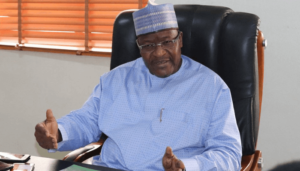The Nigerian Communications Commission (NCC), has said that the telecommunications sector has been credited with lifting millions of Nigerians out of poverty; diversifying the economy and providing over $70bn to Nigeria’s GDP.
The Executive Vice Chairman of the NCC, Umar Danbatta, disclosed this at the 2022 Africa Tech Alliance Forum in Lagos on Wednesday.
According to him, the commission has provided the enabling environment to stimulate the deployment of necessary infrastructure pertinent to the provision of universal and affordable connectivity.
READ ALSO: Video: Singer Rema Collapses While Performing In UK

“The resultant effect of this is that today, we now have over 210 million active telephone lines, representing 110 per cent teledensity; and over 150 million Internet subscribers as well as 45 percent broadband penetration which has enabled over 80 million broadband subscriptions.
“Telecommunications has been credited with lifting millions of Nigerians out of poverty; diversifying the economy and providing over $70bn to Nigeria’s GDP; it has also provided thousands of Nigerians with various employment opportunities. A glance at Nigeria’s historical data on its GDP portrays the upward trajectory of the country’s GDP since the liberalisation of the telecommunications sector. In 2001, Nigeria’s GDP was $74.03 billion, in 2005, it grew to $176.13 billion, and it currently stands at $440.78 billion, and telecom has been a key driver of this growth,” he said.
Representing Danbatta the director of digital economy, NCC, Augustine Nwulunne, said that digital connectivity has a major role in advancing the gains of development and sustaining the future, as well as attaining the needed quota in attaining a sustainable future and actualizing the objectives of the Sustainable Development Goals (SDGs).
He also explained that the quality of life is now being measured in terms of digital connectivity that promotes businesses, social and economic wellbeing of the citizens.
READ ALSO: Ataga: Chidinma, Foster Father Had Sexual Relationship – Police Witness
“Connectivity and development in Nigeria have not been fortuitous, rather they have been as a result of measured, painstaking and strategic policies implementation in the telecommunications sector by the NCC and relevant stakeholders, and we are committed to driving robust and vibrant telecoms sector to enhance further growth of Nigerian economy in all its spheres.
“The Commission has provided the enabling environment to stimulate the deployment of necessary infrastructure pertinent to the provision of universal and affordable connectivity,” the Nwulunne said.
According to him, telecommunications sector has become an enabler of economic growth, providing the necessary digital succours that bring greater efficiency in service deliveries in education, healthcare, transportation, commerce, financial services, and other sectors of the economy with greater impact on the nation’s Gross Domestic Product (GDP) as well as enhancing other sectoral growth correlating to each of the 17 goals on the SDGs.
READ ALSO: NCC Alerts Nigerians On Dangerous Mobile Apps That Steals Personal Data – [Full List]
Speaking further, he disclosed that the Commission is also driving implementation of various policies and frameworks including the Nigerian National Broadband Plan (NNBP) 2020-2025, the National Digital Economy Policy and Strategy (NDEPS) 2020-2030; and the ongoing deployment of Fifth Generation (5G) network and other digital interventionist projects aimed at driving universal service availability, accessibility, and availability.




